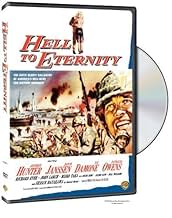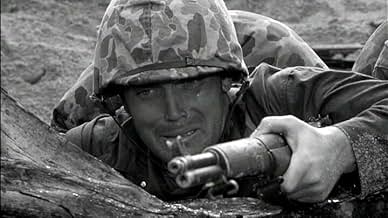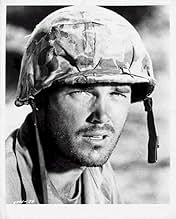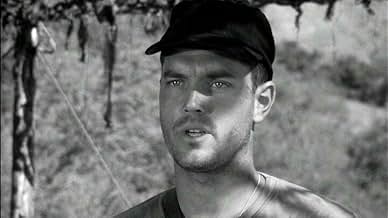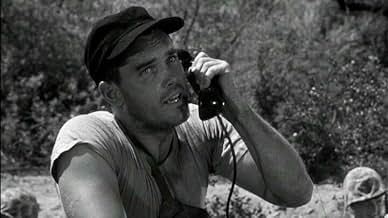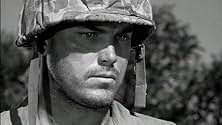IMDb RATING
6.9/10
1.7K
YOUR RATING
When his adoptive Japanese-American family is sent to Manzanar after Pearl Harbor, a young Chicano enlists in the marines to become a hero in the Battle of Saipan.When his adoptive Japanese-American family is sent to Manzanar after Pearl Harbor, a young Chicano enlists in the marines to become a hero in the Battle of Saipan.When his adoptive Japanese-American family is sent to Manzanar after Pearl Harbor, a young Chicano enlists in the marines to become a hero in the Battle of Saipan.
- Director
- Writers
- Stars
- Awards
- 3 nominations total
George Takei
- George Une
- (as George Takai)
Tsuru Aoki
- Mother Une
- (as Tsuru Aoki Hayakawa)
- Director
- Writers
- All cast & crew
- Production, box office & more at IMDbPro
Featured reviews
A great war/personal true story, as previously commented, about a Mexican-American young man from Boyle Heights (just east of Los Angeles) CA., who worked close with the migrant Japanese-American workers and learned to speak Japanese. He joined the USMC First Marine Division and was the recipient of the Naval Cross for his exploits on Saipan Island. He has since written a book "Saipan: Suicide Island" and comments heavily on the movie. Guy is proud of his Mexican-American heritage and very very proud of the First Marine Division - USMC. He lives in Northern California and is a great American. I say this because of his continued service to this country. He continues to get involved in services for the community and especially our youth. I was 11 years old when I saw this movie (1962) two years after it's release. I loved it for the war action and the personal story. I was impressed that this person cared and tried hard to do what he thought was the right thing. Vic Damone and David Jansen played good roles as well as Jeffery Hunter. Hollywood was reluctant to depict Mexicans on the screen as regular people. That is why Jeffery Hunter played an Italian-American in this film. Anthony Quinn had just completed "Requiem for a Heavyweight". Mr. Quinn lived in the same heights as Guy. My parents would tell us kids that he was one like us. I am not negative buy simply express my feeling and recollections. Anyway, I always recommend this movie to my friends and consider it in the Top 10 for war films. If ever the chance to read Guy's book or speak with him, do not pass on the opportunity. Check out this movie - there are wheels turning to remake this movie. Guy's story continues. ..
Guy Gabaldon died Thursday August 31, 2006 at his home in Old Town, Fla. He was 80. The cause was a heart attack.
From an L.A. Times Article:
The actions that earned Gabaldon the nickname "the Pied Piper of Saipan" took place in June 1944 on the 25-mile-long island in the Northern Marianas in the western Pacific Ocean. Marine Pvt. Gabaldon killed 33 Japanese soldiers on his first day of combat, he said. Later he changed tactics.
Disobeying orders, Gabaldon went behind enemy lines by himself looking for Japanese. He "daringly entered enemy caves, pillboxes, buildings and jungle brush, frequently in the face of hostile fire," reads the citation that went along with his Navy Cross. The goal was to get the Japanese to surrender.
Years later, Gabaldon called his actions foolish, but back then he had reasons to believe he would succeed.
Many years before, in Boyle Heights (Los Angeles, CA), a Japanese American family had taken in Gabaldon a wayward boy, prone to trouble and raised him. He experienced Japanese language, food and culture firsthand.
During the war years the family was sent to an internment camp and Gabaldon joined the Marines. He used his limited Japanese language skills in his contacts with Japanese soldiers and civilians.
From an L.A. Times Article:
The actions that earned Gabaldon the nickname "the Pied Piper of Saipan" took place in June 1944 on the 25-mile-long island in the Northern Marianas in the western Pacific Ocean. Marine Pvt. Gabaldon killed 33 Japanese soldiers on his first day of combat, he said. Later he changed tactics.
Disobeying orders, Gabaldon went behind enemy lines by himself looking for Japanese. He "daringly entered enemy caves, pillboxes, buildings and jungle brush, frequently in the face of hostile fire," reads the citation that went along with his Navy Cross. The goal was to get the Japanese to surrender.
Years later, Gabaldon called his actions foolish, but back then he had reasons to believe he would succeed.
Many years before, in Boyle Heights (Los Angeles, CA), a Japanese American family had taken in Gabaldon a wayward boy, prone to trouble and raised him. He experienced Japanese language, food and culture firsthand.
During the war years the family was sent to an internment camp and Gabaldon joined the Marines. He used his limited Japanese language skills in his contacts with Japanese soldiers and civilians.
Gabaldon was born and raised in Boyle Heights and attended Roosevelt High School with my brother-in-law Edwardo. He was not rejected by the Marines because of his ethnicity (Mexican-American) but because at 5'4" tall he did not meet Marine standards. It should be noted that the Marines were not adverse to recruiting in predominately Chicano communities. Guy was not "raised" by a Japanese family, but he did spend a couple of his teen year's with a Japanese family where he learned some basic Japanese. He was far from fluent in Japanese. However, the Marine Corps recruited him because they believed his knowledge of Japanese would be useful. The movie went to great lengths to hide Guy's true ethnicity. First, he was portrayed by Jeffrey Hunter, whose most notable role was playing 6'tall, blond blue eyed Jesus Christ. Guy described himself as "swarthy." In addition, there is a scene where the mamasan, in order to distinguish him from her Japanese grandchildren, refers to Guy as her "All American son." I once saw the movie on the History Channel. After the movie there was a panel discussion by historians. The final obligatory question was why the movie never mentioned that Guy was Mexican-American. The historian briefly answered that the movie was focused on the treatment of Japanese Americans during WW II and that Guy's ethnicity would have distracted from that. REALLY! Seems to me it would have made the story even more interesting. Typical Hollywood. Part of selling a movie means you have to make a white guy the central character and hero. More Hollywood is the David Jansen part and the party in Hawaii.
I remember seeing this movie many times in the 60's and 70's at the theater, on television, and on VHS. I grew up watching WWII movies and remember this as one that had a special appeal to me. I guess because I lived in Japan in the 1950's and visited some of the locales from the movie. The acting was well done and the story was well told and realistic. It is interesting to view the cast when they were relatively new to movies. David Janssen and Vic Damone stand out in my memory and Jeffrey Hunter was always a class act in films. I highly recommend seeing it if possible. I do find it hard to believe that it is called a "lost classic" and runs so high for a copy. Anyone know where I could get a cheaper copy, I would like to hear from you.
I saw the movie many years ago and would love to have this movie on DVD. Jeffrey Hunter looses his best friend, David Janson, to the enemy and after that develops a deep hatred for the Japeneese. At times risking his own life to flush them out of their hiding places and kill them. At one point where he is watching the japeneese women and children hurl themselves off of the cliffs rather then be captured, he sees his own adopted Japenese family back in the states. An excellent movie that I would go the the movies to see again.
Did you know
- TriviaOn July 8, 1944, Pfc. Guy Gabaldon single-handedly brought in 800 Japanese prisoners. He is credited with a total of 1,500 from June to August, 1944 from Saipan and Tinian islands.
- GoofsIn all of Vic Damone's scenes as Cpl. Pete Lewis, he is seen wearing a very shiny gold bracelet, including in combat scenes. In reality, no person in combat would have been allowed to wear a shiny gold bracelet, nor would they have wanted to, out of concern for the bright glint given off which might betray their position. Damone should have been told to remove the bracelet during filming.
- Quotes
Capt. Schwabe: Lewis? How's it going? Says here you were shot in the ashcan.
Pete: Not bad, sir. Could have been a howitzer.
- How long is Hell to Eternity?Powered by Alexa
Details
Box office
- Budget
- $800,000 (estimated)
- Runtime
- 2h 11m(131 min)
- Color
- Aspect ratio
- 1.85 : 1
Contribute to this page
Suggest an edit or add missing content


